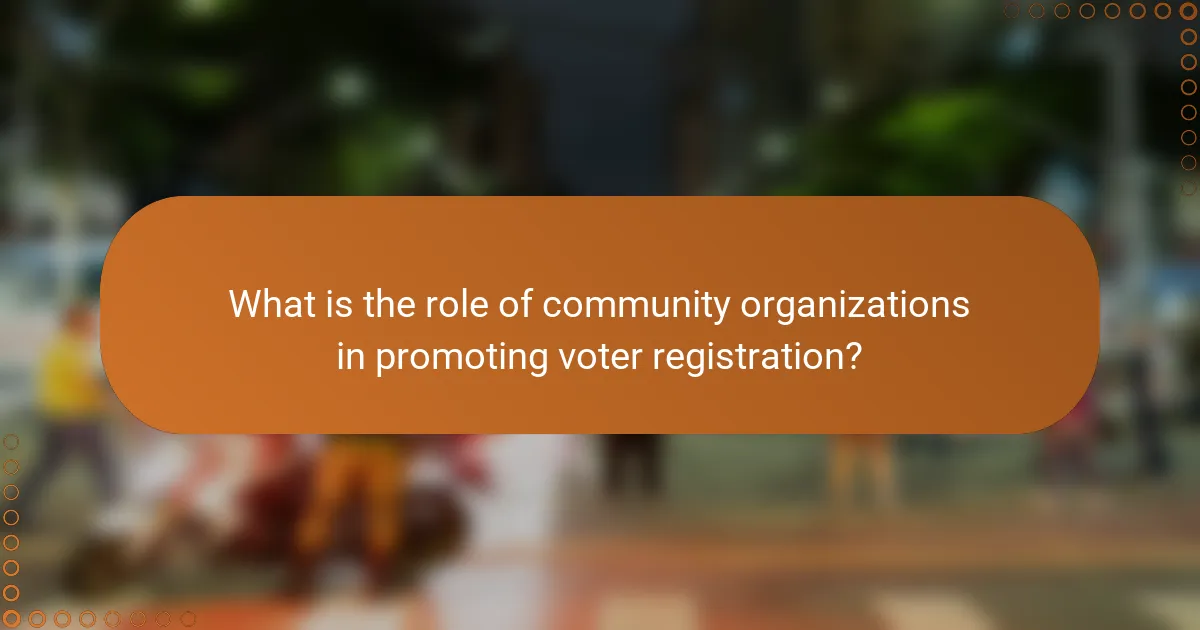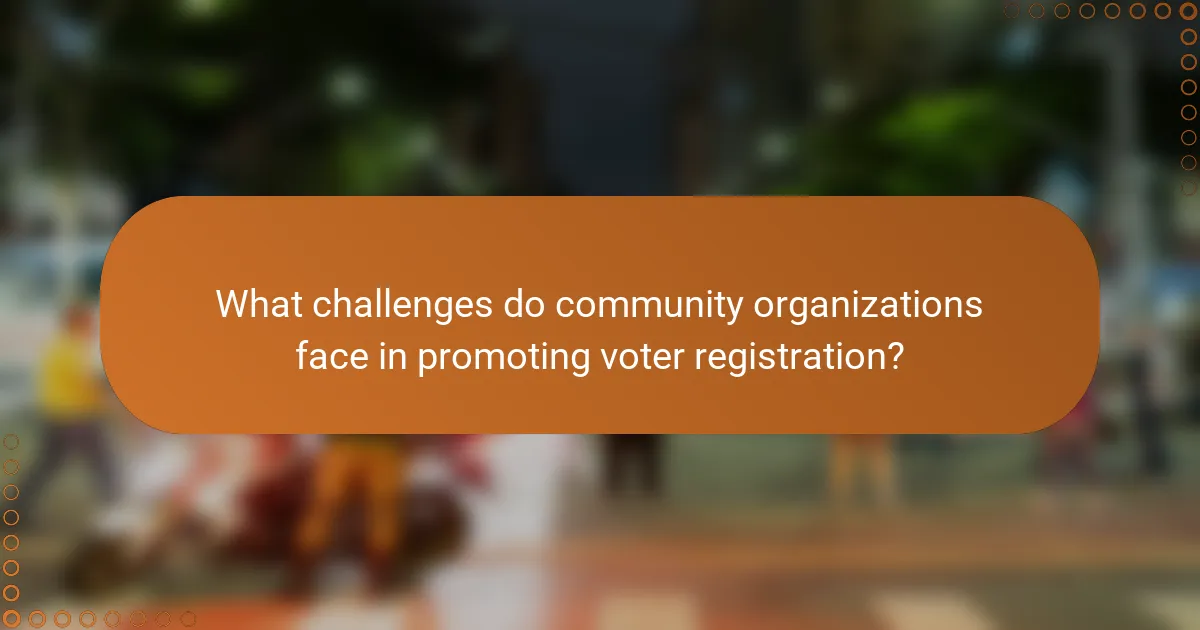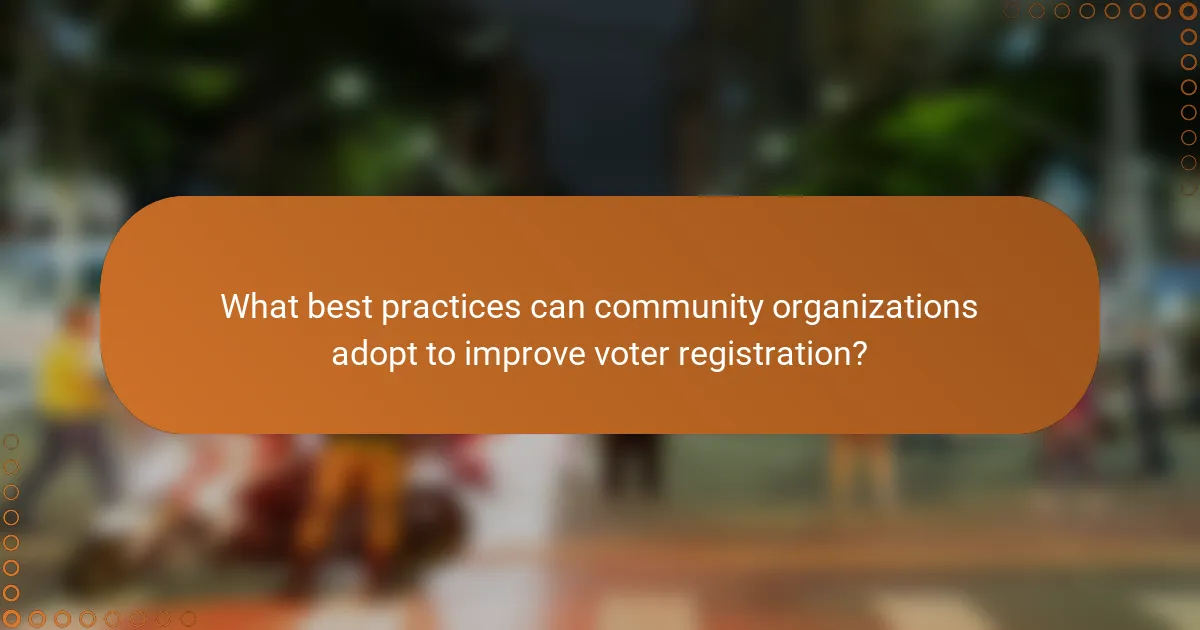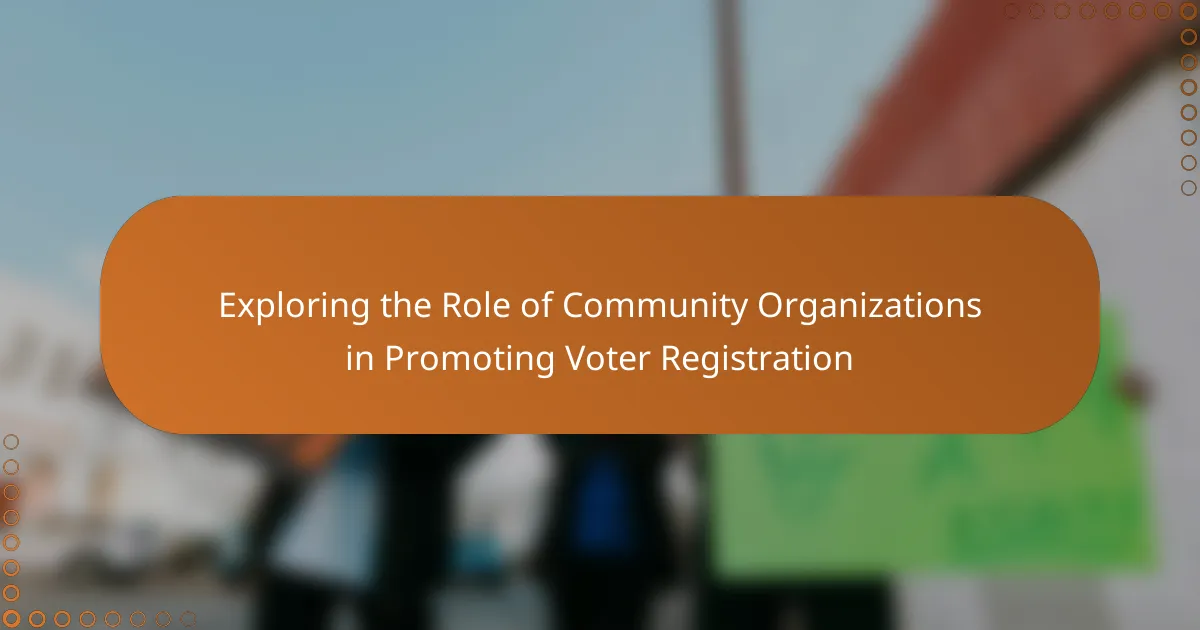Community organizations are vital entities in the promotion of voter registration, actively mobilizing local populations and providing essential resources for the registration process. These organizations conduct outreach programs to educate citizens about their voting rights and assist individuals in completing registration forms, significantly increasing registration rates among underrepresented groups. Despite facing challenges such as limited funding, misinformation, and legal restrictions, community organizations can enhance their effectiveness through targeted outreach campaigns, clear communication, and strategic partnerships. By leveraging local networks and utilizing data-driven strategies, these organizations contribute to building a more informed and engaged electorate.

What is the role of community organizations in promoting voter registration?
Community organizations play a crucial role in promoting voter registration. They mobilize local populations and provide resources to facilitate the registration process. These organizations often conduct outreach programs to educate citizens about their voting rights. They also organize events to assist individuals in completing registration forms. According to the U.S. Census Bureau, community organizations significantly increase registration rates among underrepresented groups. For example, initiatives by organizations like the League of Women Voters have led to millions of new registrations. By leveraging local networks, these organizations can effectively reach and engage potential voters. Their efforts contribute to a more informed and active electorate.
How do community organizations influence voter registration efforts?
Community organizations influence voter registration efforts by mobilizing local populations and providing resources. They often conduct outreach programs to educate citizens about the registration process. These organizations may host events, workshops, or information sessions to raise awareness. Research shows that areas with active community organizations see higher registration rates. For example, a study by the Pew Research Center found that grassroots initiatives can increase voter registration by up to 20%. Additionally, community organizations often collaborate with local governments to streamline the registration process. Their efforts can help to overcome barriers such as language, accessibility, and misinformation. This targeted approach is essential in engaging underrepresented communities.
What specific strategies do community organizations employ to engage voters?
Community organizations employ various strategies to engage voters effectively. They conduct voter registration drives to simplify the process for potential voters. Many organizations utilize door-to-door canvassing to reach individuals directly in their communities. They also host informational workshops to educate voters about the electoral process and issues at stake. Social media campaigns are leveraged to disseminate information quickly and engage younger demographics. Partnerships with local businesses and schools help expand outreach efforts. Additionally, some organizations provide transportation to polling places to remove barriers to voting. These strategies have been shown to increase voter turnout significantly, as evidenced by studies indicating that grassroots efforts can raise participation rates by as much as 10-15%.
How do community organizations identify and reach underserved populations?
Community organizations identify and reach underserved populations through targeted outreach strategies. They conduct surveys and assessments to understand the specific needs of these groups. Data analysis helps identify demographic trends and gaps in service. Collaborations with local stakeholders enhance their reach. They utilize social media and community events for engagement. Culturally relevant messaging is crucial for effective communication. Building trust within the community fosters participation. These methods have proven successful in increasing awareness and access to resources.
Why is voter registration important for communities?
Voter registration is crucial for communities because it ensures that residents can participate in the democratic process. Registered voters have the opportunity to influence local and national policies. This participation can lead to increased attention to community issues. When more people are registered, elected officials are more likely to address their constituents’ needs. According to the U.S. Census Bureau, voter turnout is significantly higher among registered individuals. Communities with higher registration rates often experience better representation. This representation can improve access to resources and services. Engaging in voter registration drives can also strengthen community bonds and awareness.
What impact does increased voter registration have on local governance?
Increased voter registration positively impacts local governance. It leads to higher voter turnout in elections. Higher turnout enhances the representation of diverse community interests. This representation can result in more responsive local policies. Local governments may prioritize issues that reflect the needs of newly registered voters. Increased engagement often drives accountability among elected officials. Studies show that communities with higher registration rates see improved civic participation. For example, a report by the U.S. Census Bureau indicated that local elections with higher voter registration correlated with more effective governance outcomes.
How does voter registration contribute to community empowerment?
Voter registration contributes to community empowerment by enabling individuals to participate in the democratic process. It increases civic engagement and ensures that community voices are heard in decision-making. Registered voters can influence policies that affect their lives and advocate for their needs. Research shows that communities with higher voter registration rates experience improved local services and resources. For example, the U.S. Census Bureau reported that neighborhoods with active voter participation often see increased funding for education and infrastructure. This correlation highlights the importance of voter registration in fostering a sense of agency and collective power within communities.

What challenges do community organizations face in promoting voter registration?
Community organizations face several challenges in promoting voter registration. Limited funding restricts outreach efforts and resources. Many organizations struggle to mobilize volunteers for registration drives. Additionally, misinformation about registration processes can hinder participation. Language barriers may prevent non-English speakers from understanding registration requirements. Some communities experience apathy towards voting, making engagement difficult. Legal restrictions on voter registration drives can also pose significant obstacles. Furthermore, the lack of access to technology can limit online registration opportunities. Finally, competition among organizations for attention can dilute their messaging and impact.
How do funding and resources affect community organizations’ voter registration efforts?
Funding and resources significantly enhance community organizations’ voter registration efforts. Adequate funding allows these organizations to conduct outreach programs effectively. For instance, financial support can be allocated to hire staff, purchase materials, and organize events. Resources such as technology and training improve the efficiency of registration processes. Studies show that organizations with higher funding levels register more voters. According to a report by the Brennan Center for Justice, increased funding correlates with a 20% rise in voter registration rates. Thus, sufficient funding and resources are crucial for maximizing the impact of community organizations in promoting voter registration.
What are common obstacles encountered by community organizations in their initiatives?
Common obstacles encountered by community organizations in their initiatives include limited funding and resources. Many organizations struggle to secure adequate financial support for their projects. This lack of funding can hinder outreach efforts and program implementation. Additionally, community organizations often face challenges in mobilizing volunteers. Finding dedicated individuals willing to commit time can be difficult. Furthermore, bureaucratic regulations can complicate initiatives. Organizations may encounter red tape that delays or prevents progress. Lastly, community engagement can be inconsistent. Organizations may struggle to maintain interest and participation from the community over time. These obstacles collectively impact the effectiveness of initiatives aimed at promoting voter registration.
How do political climates influence the effectiveness of voter registration campaigns?
Political climates significantly influence the effectiveness of voter registration campaigns. A supportive political environment can enhance engagement and mobilization efforts. For instance, during elections with high public interest, campaigns often see increased participation. Conversely, hostile political climates may discourage individuals from registering due to fear of repercussions. Research shows that states with more restrictive voting laws experience lower registration rates. In 2020, states with proactive voter outreach saw registration increases of up to 20%. This illustrates how political contexts directly shape voter registration outcomes.
What partnerships can enhance community organizations’ voter registration initiatives?
Partnerships with local businesses can enhance community organizations’ voter registration initiatives. Local businesses can provide venues for registration drives. They can also promote voter registration through their customer networks. Collaborations with schools and universities can engage young voters. Educational institutions often have access to large student populations. Nonprofits focused on civic engagement can share resources and expertise. These nonprofits can help train volunteers for registration efforts. Partnerships with government agencies can streamline the registration process. Agencies can provide data and support for outreach initiatives. Engaging with faith-based organizations can mobilize community members effectively. These organizations often have established trust and communication channels.
How can collaboration with local governments improve voter registration outreach?
Collaboration with local governments can enhance voter registration outreach by leveraging existing resources and networks. Local governments have access to demographic data that can identify underrepresented communities. This data allows targeted outreach efforts to increase registration in these areas. Additionally, local governments can provide venues for registration drives, making it more accessible for residents. They can also help promote awareness through official communication channels. Research shows that communities with local government involvement see higher registration rates. For example, a study by the U.S. Election Assistance Commission found that targeted outreach led to a 15% increase in registration in specific demographics. This collaboration fosters trust and encourages participation in the electoral process.
What role do businesses play in supporting community organizations’ voter registration efforts?
Businesses play a crucial role in supporting community organizations’ voter registration efforts. They can provide financial resources to help fund outreach programs. Businesses often offer their venues for registration drives. They can also promote voter registration initiatives through their marketing channels. Employee volunteer programs can mobilize staff to assist in these efforts. Research shows that businesses engaged in civic activities enhance community trust. According to a 2020 study by the U.S. Chamber of Commerce, companies that support voter engagement initiatives see increased employee morale. This demonstrates that businesses not only contribute resources but also foster a culture of civic responsibility.

What best practices can community organizations adopt to improve voter registration?
Community organizations can adopt several best practices to improve voter registration. They should conduct outreach campaigns targeting underrepresented populations. These campaigns can include door-to-door canvassing and community events. Providing clear information about the registration process is essential. Organizations can also offer assistance with completing registration forms. Utilizing social media to spread awareness can reach a broader audience. Partnering with local businesses and schools can enhance visibility. Tracking registration progress and adapting strategies based on data can improve effectiveness. Research indicates that targeted outreach increases registration rates significantly. For instance, a study by the Pew Research Center found that personalized outreach can boost registration by up to 20%.
How can technology be leveraged to enhance voter registration efforts?
Technology can enhance voter registration efforts by streamlining the registration process. Online platforms allow users to register quickly and efficiently from any location. Mobile applications can provide reminders for registration deadlines and assist in filling out forms. Data analytics can identify underrepresented communities and target outreach efforts effectively. Social media campaigns can raise awareness and engage younger voters. In 2020, 27 states offered online voter registration, leading to increased participation rates. These technological tools create a more accessible and informed voter base.
What tools and platforms are most effective for community organizations in voter registration?
Online voter registration platforms are the most effective tools for community organizations. These platforms streamline the registration process and enhance accessibility. Examples include Vote.org and Rock the Vote. Both platforms provide user-friendly interfaces. They offer resources for outreach and education. Social media platforms like Facebook and Twitter are also effective. They facilitate community engagement and information sharing. Research indicates that organizations using these tools see higher registration rates. A study by the Pew Research Center found that online registration increases participation.
How can data analytics improve targeting and outreach strategies?
Data analytics can significantly enhance targeting and outreach strategies by providing insights into voter demographics and behaviors. By analyzing data, organizations can identify specific groups that are more likely to engage in voter registration. This allows for tailored messaging that resonates with each demographic.
For example, organizations can use analytics to segment audiences based on age, location, or previous voting patterns. This targeted approach increases the likelihood of successful outreach efforts.
Additionally, data analytics enables tracking of outreach campaign effectiveness. By assessing which strategies yield the best results, organizations can refine their tactics over time.
Research shows that targeted outreach can increase voter registration rates by as much as 20% in specific demographics. This data-driven approach ensures that resources are allocated efficiently, maximizing impact.
What are actionable steps community organizations can take to boost voter registration?
Community organizations can take several actionable steps to boost voter registration. They can host voter registration drives in local communities. These events can be held at community centers, schools, or public events. Providing information about the registration process is essential. Organizations should distribute flyers and use social media to raise awareness. Collaborating with local businesses can enhance outreach efforts. They can also offer incentives for individuals who register. Training volunteers to assist with the registration process increases efficiency. Lastly, organizations can follow up with registered voters to ensure participation in upcoming elections.
How can community events be utilized to promote voter registration effectively?
Community events can effectively promote voter registration by providing accessible and engaging platforms for information dissemination. These events create opportunities for direct interaction between community members and voter registration advocates. For instance, hosting booths at local festivals allows organizations to reach diverse populations. Offering incentives, such as free food or entertainment, can draw larger crowds and increase participation.
Educational workshops during these events can inform attendees about the registration process and deadlines. Statistics show that community-driven initiatives increase voter registration rates by up to 20%. Collaborating with local influencers can also enhance outreach efforts. Providing on-site registration services simplifies the process for attendees. Overall, community events serve as vital touchpoints for increasing voter engagement and registration.
What are the best ways to engage volunteers in voter registration drives?
Recruiting volunteers for voter registration drives can be effectively achieved through targeted outreach and engagement strategies. First, organizing training sessions equips volunteers with the necessary skills and knowledge. These sessions can cover registration processes, local voting laws, and effective communication techniques. Second, creating a sense of community among volunteers fosters commitment. Regular meetings and social events can enhance relationships and motivate participation. Third, utilizing social media platforms can broaden outreach. Engaging content can attract potential volunteers and inform them about upcoming events. Fourth, providing incentives, such as recognition programs or volunteer appreciation events, encourages sustained involvement.
Research indicates that community organizations that actively engage volunteers see a higher turnout in voter registration efforts. A study by the National Association of Secretaries of State found that personal outreach significantly improves registration rates. By implementing these strategies, organizations can enhance volunteer engagement and optimize voter registration drives.
Community organizations are pivotal in promoting voter registration by mobilizing local populations and providing essential resources. They engage in outreach programs to educate citizens about their voting rights and assist with the registration process, significantly increasing registration rates among underrepresented groups. The article explores various strategies employed by these organizations, their impact on voter turnout, challenges faced, and the importance of partnerships with local businesses and governments to enhance voter registration efforts. Additionally, it examines how technology and data analytics can optimize outreach strategies for greater effectiveness in engaging potential voters.
